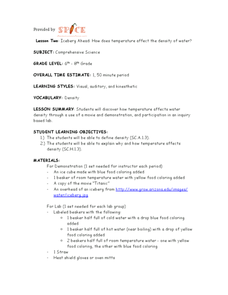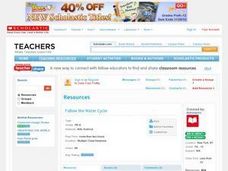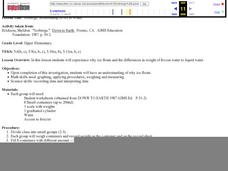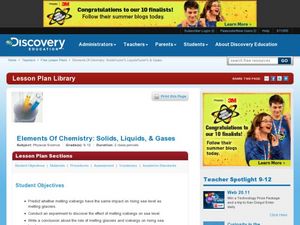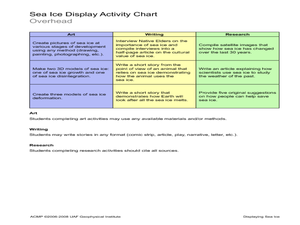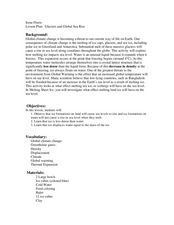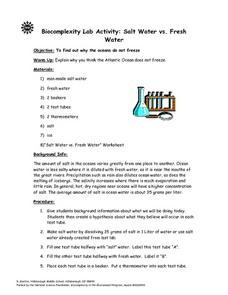Curated OER
Iceberg Ahead: How Does Temperature Affect the Density of Water?
Demonstrate how ice floats on water and get the class thinking about why icebergs are so deceiving. Investigators then experiment with mixing water of the same temperature and water of different temperatures. Make sure to explain the...
Curated OER
Sea Water Freeze
Middle schoolers observe how salinity affects the time it takes water to freeze. They participate in an experiment to determine that ice is essentially salt-free whether formed from fresh or salt water
Curated OER
Water Pollution Prevention and Conservation
Students examine how to conserve water. They also discover how to prevent water pollution. They examine the Earth's water distribution as well.
Global Oneness Project
Witnessing Icebergs
Camille Seaman's photoessay, "Witnessing Icebergs" documents just a tip of the problem of climate change through images of icebergs in both the Arctic and Antarctic polar regions. After viewing the haunting images, viewers respond to a...
Curated OER
Follow the Water Cycle
Students explore the stages in the water cycle, evaporation, condensation, and precipitation. They hypothesize about the source of rain and search for forms of water on Earth.
Curated OER
Antarctica: Effects of Salinity on Icebergs
Students investigate the effects of salinity on icebergs. In this hands on lesson, students design and conduct an investigation into how the amount of salt in ice affects its buoyancy.
Curated OER
Earthquakes
Students observe the melting of ice. In this phase change lesson, students observe ice as it melts. They discuss the process and create a Venn diagram comparing water and ice.
Curated OER
Icebergs Ahead!
Young scholars experiment with density of ice, and examine how density affects how icebergs float in water.
Curated OER
Icebergs: Relationship of Ice to Water
Students experience why ice floats and the differences in weight of frozen water to liquid water. Students explore why ice floats. They use math skills such as: graphing, applying procedures, weighing and measuring. Students also use...
National Wildlife Federation
Penguin Fun Facts
What's black and white and can dive up to 1,800 feet under water? That's right, penguins! Learn this and many other amazing facts about these unique birds with this handy reference sheet.
Curated OER
When Land Ice Melts
Students investigate what happens when land ice melts. They discuss how the melting of land ice is different than the melting of icebergs. Students observe what happens as the ice melts.
Curated OER
Ocean World
In this online interactive science activity, students respond to 7 multiple choice questions regarding icebergs. Students may submit their answers to evaluated.
Curated OER
A SALT WATER-Y WORLD
High schoolers observe a model of the distribution of the earth's water and compare the relative volumes and percentages of types of water on earth.
Curated OER
Elements of Chemistry: Solids, Liquids and Gases
Students predict if icebergs melting has an effect on the sea level rising. In this global warming lesson students complete an experiment to see the effects of melting icebergs and write a conclusion on their data collected.
Peace Corps
Culture is Like an Iceberg
What influences the way you dress, or celebrate holidays, or connect with your friends? Explore the cultural traits that are not easily seen with an engaging discussion. Using the model of an iceberg, learners place features of culture...
Curated OER
Ice Balloons
Students explore the properties of ice. In this states of water instructional activity, students examine the properties of icebergs and ice cubes as they participate in an activity that requires them to freeze a balloon half-filled with...
Curated OER
Antics in Antarctica
In this ESL editing worksheet, students will focus on error correction and editing. Students will read a short passage correcting any spelling mistakes or omissions from the article.
Curated OER
Displaying Sea Ice
Learners display their knowledge of sea ice. In this earth science lesson, students create displays reflecting their understanding of sea ice.Learners research the development of sea ice on a variety of bodies of water, and use proper...
Curated OER
Environment: Methane Sources
Students discover how human activity is increasing the release of methane gas into the atmosphere. Woring in groups, they visit the Eduzone Website and complete worksheets. Students identify the natural and human causes of methane gas.
Curated OER
Glaciers and Global Sea Rise
Learners explain how melting glaciers affect global warming. For this earth science lesson, students investigate the change in ice density as it melts. They discuss the human and environmental impact of rising sea levels.
Curated OER
Salt Water vs. Fresh Water
Students explore why the oceans do not freeze. They explain why they think the Atlantic Ocean does not freeze. Students are given background information about what they are doing. They create a hypothesis about what they believe...
Curated OER
Landforms in a Tub
Fifth graders use common household items to build landforms and simulate weathering and erosion.
Curated OER
Tsunami
Students examine what causes tsunamis and why they all behave differently. In this tsunami instructional activity students complete a group activity after viewing a video.
Curated OER
Investigating Fresh Water Ecosystems
Sixth graders examine the fresh water ecosystems. In this environmental instructional activity, 6th graders work in groups to collect information about a fresh water ecosystem and report their findings to the class in the form of a...


